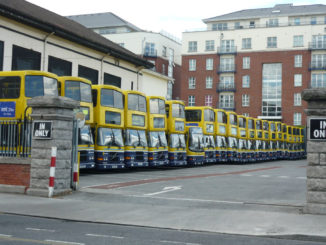
[dropcap]E[/dropcap]very Monday evening from outside the National Tennis Centre in DCU, you can hear shouts of encouragement, instructions being called, the clash of rackets and a strange jingling noise. For many of the players on the court, these sounds are all they need to play a competitive game of tennis.
Blind, or visually impaired tennis is “all about playing to peoples strengths”, according to Sarah O’Donohoe, one of the coaches in the club.
Sound really is the key to it, according to O’Donohoe: “Across the game the starting person would always say ‘ready’, and your opponent would say yes or no. Before I hit the ball I say ‘play’ so she knows that it’s coming and then it’s down to the sound of the ball. Different players will have more vision than others and obviously everybody uses what they can.”
The players use sound balls that jingle when they move so that they can be easily detected from across the court. Tactile lines are used so that players can feel where the edges of the court are.
The sound balls are imported from Japan, and a certain amount of bounces are allowed according to your level of vision.
The atmosphere in the club is welcoming and friendly. The players, coaches and volunteers help guide each other to the court and set up the tactile lines for drills. They gush over a player’s guide dog and ask about each other’s weeks as they get their rackets ready to play.
“We’re actually some of the most competitive people you’ll meet,” Sarah joked before they began, and this becomes apparent even before the first ball is thrown. The players tease each other good-naturedly throughout the training, reminding their opponents of which tournaments they won against each other and against other clubs.
The sport caters for the fully blind to visually impaired people, categorising their ability so that matches are as fair as possible. The categories go from B1 to B5, with B1 being completely blind and B2 and B3 being visually impaired.
“If you’re in the B1 category you have no vision or light perception, you play on a smaller court with tactile lines as the base line. Then if you’re in the B2 or B3 category you play on a three quarter court,” O’Donohoe said.
“I come every Monday, it’s absolutely brilliant,” said Alba Hession, who has been coming to practice for nearly two years. “It’s good for your health, and it’s good for your mind and all over.”
Alba first got involved at Mayfest, an event organised by Vision Sports Ireland, which exhibited many blind and visually impaired sports.
“I love sports, always did since day one,” she said. “I was doing the rowing, I was doing the blind tennis, crazy golf, there was blind football there was a few other things that I tried out tandem cycling too.”
The game was launched by President Michael D. Higgins at an exhibition event in Dublin in May 2016, and has been described by Vision Sports Ireland as the “fastest ever growth of any sport played by the blind/vision impaired community”.
Two pilot programmes began Dublin in the summer of 2016 in the National Tennis Centre in DCU and at Shankill Tennis Club.
Since then the sport has grown rapidly, with clubs establishing all over the country, with branches opening in Belfast, Sligo, Navan and Cork last year. Further expansion is expected for the start of 2018 in Dundalk, Galway, Waterford and Killaloe.
In May last year the first Irish Blind Tennis team composed of eight players competed at the International Blind Tennis Association’s world games in Alicante, Spain.
“Some of those players from Japan who have been playing for twenty or thirty years were just incredible,” Sarah said. “Players from the UK who were playing for about 10 years, and then everywhere from Mexico to Singapore, all over the place.”
“I love it, I really look forward to it. It’s a great way to unwind after all of the stress in college,” said Emma Currens, a second year occupational therapy student from Trinity. “I saw it on the Vision Sports website and I was just looking for a sport to get involved in. I thought I’d try tennis and if I didn’t like that I could try something else, but I ended up loving tennis so I stuck with it.”
Clare Whelan jokes with the other players about being the oldest one there, “but I’m enjoying it the most”, she says.
“I love the energy it has and I get from it. I never played tennis as a sighted person, I was never interested in it, but now I like it all”.
The second Irish national championships will take place in February this year and on April 29 and 30th Dublin will host the Takei Cup, named after Miyoshi Takei, founder of Blind Tennis. They hope that teams from Asia, Europe and Africa will take part in the event.



